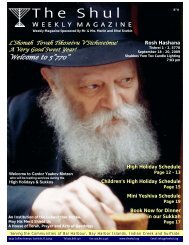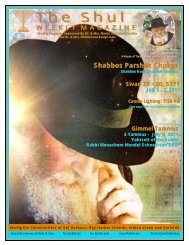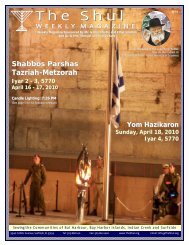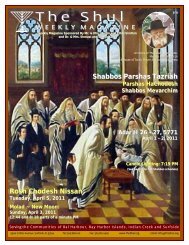You also want an ePaper? Increase the reach of your titles
YUMPU automatically turns print PDFs into web optimized ePapers that Google loves.
Counting the Omer<br />
Inspiration, Insights & Ideas<br />
Bringing Torah lessons to LIFE!<br />
Halacha of the Week<br />
By Rabbi Dov Schochet<br />
Starting from the day the Omer offering was brought in the Temple<br />
(it was a meal offering of barley brought on the second day of<br />
Passover) the Torah commands us to count seven weeks (which<br />
bridge the Omer offering and the festival of Shavuos). This<br />
commandment was actually a matter of great contention between<br />
those who accept the Oral Law and the sects which only believed in<br />
the Written Law and not willing to accept any oral tradition.<br />
The issue was the language the Torah uses in this week’s portion,<br />
“And you shall count unto you from the morrow after the Shabbat,<br />
from the day that you brought the sheaf of the waving; seven weeks<br />
shall there be complete". While a literal reading would obviously<br />
imply that the counting must always begin on a Sunday (the day<br />
after the Shabbat) the Mosaic tradition was to understand this word<br />
as referring to the festival of Passover (which can also be referred to<br />
as Shabbat) and not the seventh day of the week. Obviously the<br />
Halacha follows this tradition and therefore, starting from the<br />
second day of Passover, for 49 nights, there is an obligation to count<br />
the Omer.<br />
The proper way to count is to mention the days and the weeks e.g.<br />
from day 1 through 6 one should say "today is day 1 to the Omer etc.<br />
from day 7 and on one should mention the weeks as well e.g. on day<br />
13 one should say "today is 13 days which are 1 week and 6 days to<br />
the Omer"<br />
It is proper to count while standing although if one counts sitting<br />
down they do not have to count again.<br />
The counting can be done in any language one understands. If one<br />
does not understand what they're saying even if they are counting<br />
in Hebrew they have not fulfilled their obligation.<br />
As this is an individual obligation one is required to fulfill the<br />
Mitzvah on their own and not rely on an emissary. Although if one<br />
hears their friend counting and has in mind to exempt their<br />
obligation it is sufficient, it is preferable for one to count every night<br />
on their own.<br />
Like all Mitzvot which are time bound, women are exempt although<br />
if they wish they can count the Omer with its requisite blessing.<br />
Sefardic women do not recite the blessing.<br />
There is a dispute if the counting can only be done at night or if one<br />
can count the following day as well, therefore in the event one<br />
forgot to count at night they should count the following day (to<br />
fulfill the Mitzvah according to the second opinion) but do so<br />
without the prior blessing.<br />
There are two opinions as to the nature of this Mitzvah, one holding<br />
that every day is an independent commandment while the second<br />
holds that one can only count any of the days if they have counted<br />
all the prior ones. The accepted practice if one forgot to count one of<br />
the days is to continue counting the rest of the days like the first<br />
opinion (as one might be fulfilling a Mitzvah) but to do so without<br />
the prior blessing as the rule is anytime one is not certain if a<br />
blessing must be recited we do not recite it. It is important to note<br />
the Mitzvah is not the blessing but the counting and therefore if<br />
one missed a day it is not a reason to be lax with the counting of<br />
the rest of the Omer. (In a case where one is uncertain if they<br />
Parsha Messages<br />
11<br />
missed a night or not or where one forgot to count at night but<br />
counted the following day without the blessing they can count the<br />
following days with the blessing).<br />
The lesson of the Omer is clear, all days must be counted. Every<br />
moment of our lives has meaning and purpose and must be<br />
properly accounted for. And as the first counting culminated with<br />
receiving the Torah by us all "counting our days" may we merit to<br />
the revelation of the coming of Moshiach.<br />
<br />
Your Guide to Personal Freedom<br />
Counting the Omer: Week Three<br />
This is an excerpt from “Counting the Omer – A Spiritual Guide” by<br />
Rabbi Simon Jacobson<br />
Day 18 - Netzach of Tiferet: Endurance in Compassion<br />
Is my compassion enduring and consistent? Is it reliable or<br />
whimsical? Does it prevail among other forces in my life? Do I have<br />
the capacity to be compassionate even when I'm busy with other<br />
activities or only when it's comfortable for me? Am I ready to stand<br />
up and fight for another?<br />
Exercise for the day: In the middle of your busy day take a moment<br />
and call someone who needs a compassionate word. Defend<br />
someone who is in need of sympathy even if it's not a popular<br />
position.<br />
Day 19 - Hod of Tiferet: Humility in Compassion<br />
If compassion is not to be condescending, it must include humility.<br />
Hod is recognizing that my ability to be compassionate and giving<br />
does not make me better than the recipient; it is the<br />
acknowledgment and appreciation that by creating one who needs<br />
compassion G-d gave me the gift of being able to bestow<br />
compassion. Thus there is no place for haughtiness in compassion.<br />
Do I feel superior because I am compassionate? Do I look down at<br />
those that need my compassion? Am I humble and thankful to G-d<br />
for giving me the ability to have compassion for others?<br />
Exercise for the day: Express compassion in an anonymous fashion,<br />
not taking any personal credit.<br />
Day 20 - Yesod of Tiferet: Bonding in Compassion<br />
For compassion to be fully realized, it needs bonding. It requires<br />
creating a channel between giver and receiver; a mutuality that<br />
extends beyond the moment of need. A bond that continues to live<br />
on. That is the most gratifying result of true compassion.<br />
Do you bond with the one you have compassion for, or do you<br />
remain apart? Does your interaction achieve anything beyond a<br />
single act of sympathy?<br />
Exercise for the day: Ensure that something eternal is built as a<br />
result of your compassion.<br />
Day 21 - Malchut of Tiferet: Nobility in Compassion<br />
Examine the dignity of your compassion. For compassion to be<br />
complete (and enhance the other six aspects of compassion) it must<br />
recognize and appreciate individual sovereignty. It should boost<br />
self-esteem and cultivate human dignity. Both your own dignity and<br />
the dignity of the one benefiting from your compassion.<br />
Is my compassion expressed in a dignified manner? Does it elicit<br />
dignity in others? Do I recognize the fact that when I experience<br />
compassion as dignified it will reflect reciprocally in the one<br />
who receives compassion?














